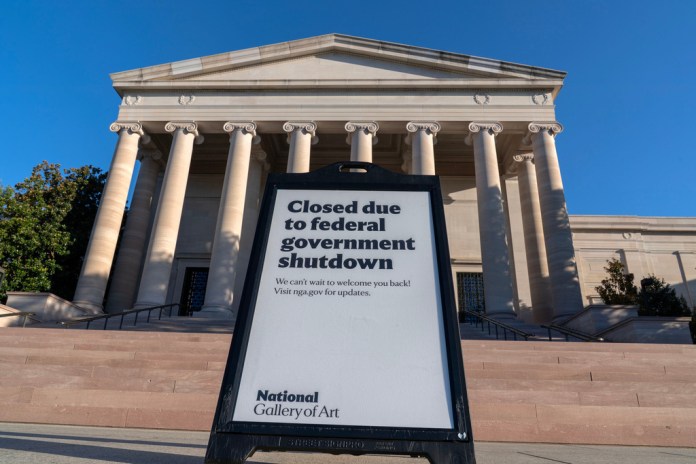The longest government shutdown in U.S. history has ended after 43 days, and while many received back pay and moved on, for others, the effects are still being felt.
Due to the Government Employee Fair Treatment Act of 2019, federal employees are guaranteed back pay during shutdowns, but for federal contractors who work with government employees, the situation is a little more complicated.
According to the Department of Labor, as of 2021, there were 327,000 federally contracted employees earning less than $15 an hour. Many of these lower-wage federal contractors, including support and janitorial staff, often face immediate financial strain when government pay is delayed.
WHAT TO EXPECT WITH MISSING ECONOMIC DATA AS GOVERNMENT SHUTDOWN ENDS
The Washington Examiner spoke with a federal contractor who was not authorized to speak to the media and feared jeopardizing her employment if identified; we use a first name throughout this article.
A contractor’s personal financial struggle during the shutdown
For Annette, a contractor with Texas-based consulting firm AvantGarde LLC, the government shutdown hit immediately. Her hours went from 40 to zero, and with them, her income vanished overnight. The loss of pay quickly affected her ability to cover basic expenses, from her mortgage to her brother’s medical care.
“My immediate reaction was, ‘Here they go again,’” she told the Washington Examiner.
“By the second or third week, I started to really worry because my circumstances are different,” Annette continued. “I’d taken in my brother and spent a lot getting him settled and situated with his medical care, so my savings were already diminished. I started to worry about my own expenses, especially the mortgage. But what really concerned me was being able to get medication for my brother, because medication is not cheap, no matter how you look at it.”
Annette said she was barely able to cover essentials in the early weeks of the shutdown, relying on a small savings account and a zero-interest loan provided by AvantGarde. By the fourth week, she started using credit cards.
Unexpected emergencies compounded her financial strain — a mattress flying off a truck shattered her windshield, costing $1,000, and a home repair added another $3,000. “None of this could have happened at a worse time,” she said.
FEDERAL CONTRACTORS STRUGGLE AS SHUTDOWN DRAGS ON: ‘A FEW PAYCHECKS AWAY FROM LOSING EVERYTHING’
Contractors are paid to work for and at the will of the federal government, but are employed by a third-party company that receives funding for their work from the government. However, their checks come from their employer, not the government directly. Without work and government pay stubs, many contractors were in a unique position as they were not eligible for assistance, including loan assistance from banks, as federal employees.
The toll is felt not only by contractors directly, but also by their employers: the third-party company.
Small business owners’ financial burden
AvantGarde LLC CEO and founder Rebecca Contreras said nearly half of the contract workers at her firm had their hours reduced to zero during the shutdown, severely costing her business. She had to pull funds from her and her business partners’ personal funds at times.
“For small businesses like us, ‘recovery’ doesn’t happen the day Congress passes a funding bill,” Contreras told the Washington Examiner.
“Our employees collectively lost about $2 million in wages that they will never get back, and we burned through cash reserves covering what we could … and slowly trying to restore the financial cushion that was wiped out by a political decision we had no control over,” she added.
Federal agencies often operate on strict timelines dictated by fiscal-year budgets. Because of this, when operations stop due to a shutdown, some of the work cannot be made up, meaning contractors who were hired for those projects cannot be reassigned. Contreras said her company has already had assignments canceled because of both time and money lost from the shutdown.
“Due to ongoing uncertainties about the budget beyond Jan. 31, we’ve been informed of future reductions that will result in permanent job loss,” Contreras said. “Our goal is to restore as many hours as possible, especially for the people who were hit hardest, but I have to be honest: not every lost hour is coming back.”
Concerns of another government shutdown
On Nov. 12, the government reopened. However, it is only funded through Jan. 31.
Republicans and Democrats remain at odds over enhanced healthcare subsidies provided by the Biden administration under the Affordable Care Act, set to expire on Dec. 31. If the subsidies expire, many Americans could see their healthcare premiums rise, an issue Democrats are still hoping to find a solution for, while Republicans have not confirmed if they will support it, leading to another possible shutdown.
“They’re talking about this resolution getting us to January, and when January comes, are they going to just do this nonsense all over again?” Annette told the Washington Examiner. “What I’m doing now is trying to pay down as much as possible whenever I get paid. It’s not really a time to put anything in savings.”
“It’s going to take me seven months to recover and start building savings, and if they shut down again, that doesn’t give me much time at all,” she added.

Contreras said the possibility of another shutdown is especially troubling for her and other contractors, as they are often left out of the conversation and cannot simply “ride it out” like federal employees.
“Almost no one talks about the contract employees standing right next to federal workers, doing critical work but who will never receive back pay,” she told the Washington Examiner.
“There’s a dangerous assumption that small businesses can just ‘ride it out’ like the federal employees, as if we have unlimited cash sitting around,” Contreras added. “What they misunderstand is how fragile our cash flow is: when invoices sit unpaid and hours are cut to zero, we lose real people, real wages, and sometimes entire businesses that took years to build from the ground up.”
HOUSE VOTES TO REPEAL ‘ARCTIC FROST’ PROVISION ADDED TO GOVERNMENT FUNDING DEAL
Contractors like Annette echoed that warning, saying shutdowns leave them shouldering the fallout while lawmakers remain insulated.
“We’re not being valued — we’re being used as pawns, and that’s not fair,” Annette told the Washington Examiner. “I don’t think they get the gravity of the situation. If their paychecks were withheld the way ours were, I think they would have come to some type of agreement or at least had discussions sooner. But it’s always a zero-sum game played at our expense. They can play their political games because they’re not the ones paying the consequences.”

